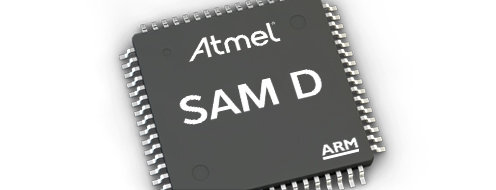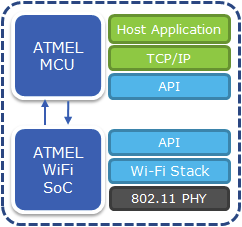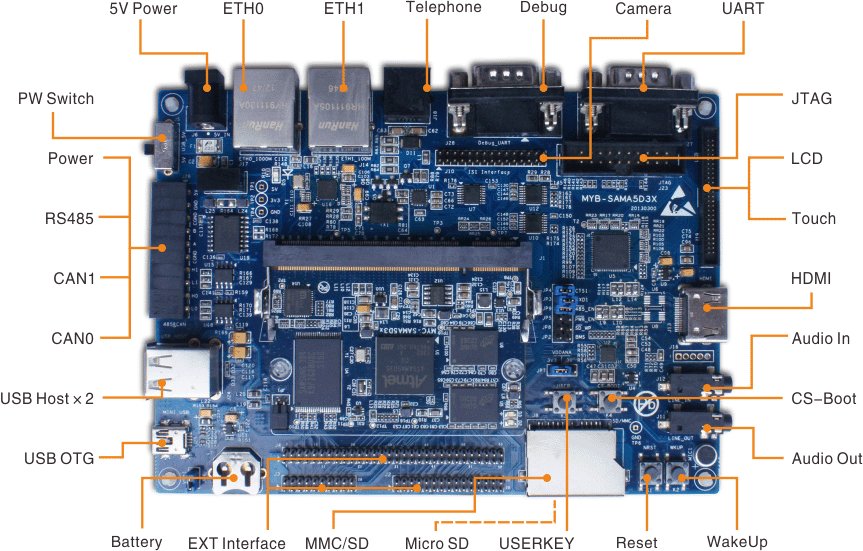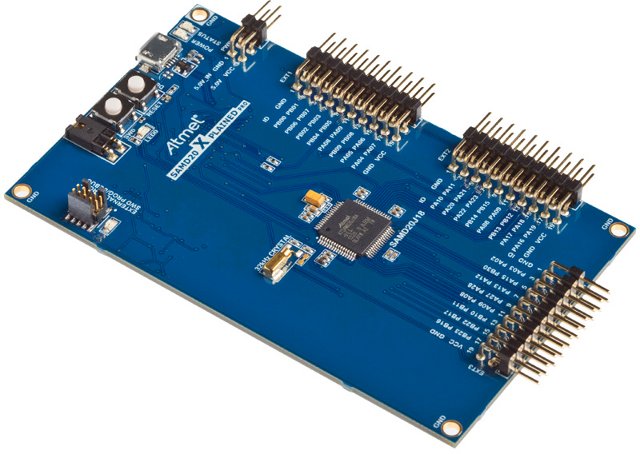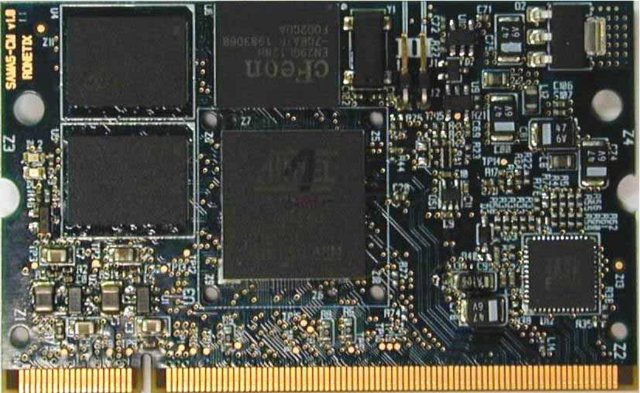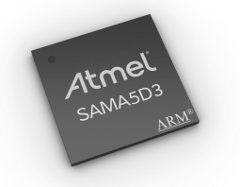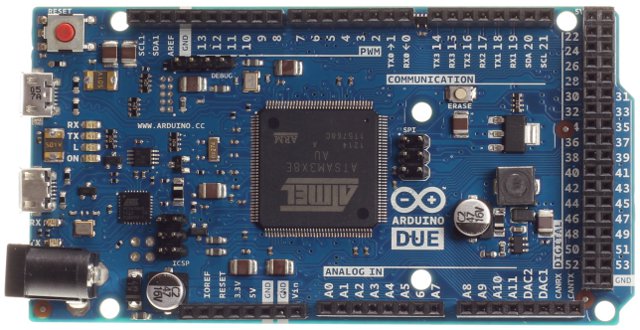Atmel launched SAM D20 MCU family based on ARM Cortex M0+ last year, and at Embedded World 2014, the company has launched three new MCU families featuring ARM ultra low power core with SAM D10, SAM D11, and SAM D21 families and their corresponding Xplained PRO development boards. Atmel four SAM D families target different applications and price points: SAM D10 – The smallest member of the SAM D family in terms of memory, pin count, and features. SAM D11 – Adds full-speed USB not available on the SAM D10. SAM D20 – “Offers a rich set of peripherals, flexibility, and ease-of-use with low power consumption.” SAM D21 – Adds features such as full-speed USB, DMA, high-end timers/counters to D20 design. I’ve compared the four families in the table below: SAM D10 SAM D11 SAM D20 SAM D21 # MCU in Family 4 4 15 12 MCU Core ARM Cortex-M0+ […]
Atmel Introduces ARM Cortex M0+ based SmartConnect Wi-Fi Modules and SmartConnect Zigbee SoCs
In order for the Internet of Things to take off, wireless connectivity solutions with ultra low power, lost cost, and small footprint are needed. Atmel seems to have made a step in the right direction by launching SmartConnect Wi-Fi modules and Zigbee SoCs featuring an ARM Cortex M0+ core. SmartConnect Wi-Fi does not appear to be a single chip solution, but instead Atmel has created a family of Wi-Fi modules integrating the company’s ultra-low power Wi-Fi SoChip with an ARM Cortex M0+ based MCU. These modules will enabled battery-powered Wi-Fi connectivity for IoT endpoints such as thermostats, and temperature sensors in a cost effective way. The company will provide a software solution with application and security protocols such as TLS, TCP/IP stack and an RTOS, all of which can be downloaded via Atmel Studio 6 Integrated Development Platform (IDP). SmartConnect ZigBee SAM R21 combines an ARM Cortex M0+ core with […]
MYIR MYD-SAMA5D3X Development Boards Feature Atmel ARM Cortex-A5 SAMA5D3 Processors
MYIR Tech, a company based in Shenzhen, and ARM Connected Community Member, has recently made available MYD-SAMA5D3X boards powered by Atmel ATSAMA5D3 ARM Cortex-A5 embedded MPU. Like many development boards, thise are composed of a baseboard coupled by a 200-pin SO-DIMM computer-on-module (CoM) featuring one of the four Atmel SAMA5D3 processor: SAMA5D31, SAMA5D33, SAMA5D34 and SAMA5D35. The boards all feature 512MB DDR2 SDRAM, 256MB Nand Flash, 16MB Nor Flash and 4MB Data Flash on board. Typical applications developed with these boards include control panel/HMI, smart grid, medical and handheld terminals, outdoor GPS, DECT (digital enhanced cordless telecommunications) phones, and more. MYD-SAMA5D3X boards specifications: Processor – Atmel SAMA5D31, SAMA5D32, SAMA5D34 or SAMA5D35 Cortex A5 up to 536MHz with 128KB of SRAM and 160KB of ROM System Memory – 512MB DDR2 SDRAM Storage – 256MB NAND Flash, 4MB Data Flash, 16MB Nor Flash, one MMC/SD card slot, and one microSD card slot Peripheral […]
Atmel SAM D20 MCU Family Features ARM Cortex M0+ Core
Atmel has just announced its SAM D20 family of embedded Flash micro-controllers based on ARM Cortex-M0+ processor core, designed for low power applications such as home automation, consumer, smart metering and industrial applications. The key features of Atmel SAM D20 MCUs are as follows: Cortex M0+ @ 48MHz, 2.14 Coremark/MHz Single-cycle IO access, supporting a pin toggling frequency up to 24 MHz Eight-channel event system Peripherals: Four to six serial communication modules (SERCOM) configurable as UART/USART, SPI or I2C Up to eight 16-bit Timer/Counters Peripheral touch controller (PTC) that supports up to 256 channels and supports buttons, sliders, wheels, and proximity Real Time Clock (RTC) and calendar with leap year correction 12-bit 350ksps ADC and 10-bit DAC Power Consumption: <150µA/MHz <2µA RAM retention and RTC Options between internal and external oscillators and on-the-fly clock switching The family supports features 14 new devices available in 32-, 48- and 64-pin package options […]
Ronetix SAMA5D3x-CM System-on-Modules Powered by Atmel SAMA5D3 eMPUs
Earlier this month, Atmel launched SAMA5D3 Cortex A5 embedded processor family, and Ronetix recently unveiled CPU modules based on the platform. SAMA5D3x-CM are SODIMM SoM based on SAMA5D3 series processor with 512MB DDR2, 256MB NAND Flash, 4MB SPI Flash, and Gigabit Ethernet. The key features of the modules are as follows: MCU – AT91SAMA5D3x series, 536 MHz ARM Cortex-A5 @ 1.2V (SAMA5D31, SAMA5D33, SAMA5D34 or SAMA5D35) System Memory – 512 MB DDR2 SDRAM, 32-bit Storage: 256 MB NAND Flash 16 MB NOR Flash (optional) 4 MiB Atmel SPI Flash One Wire 1024-bits EEPROM and 64-bits ROM Connectivity – 10/100/1000 MBit/s Ethernet Dimensions – 67.6x40mm (SO-DIMM 200 JEDEC MO-274 module) Temperature range – 0° +70°C or -40° to +85° C SAMA5D3-CM boards support Linux 3.6.9 and Android 4.0. Those are actually the modules used in Atmel SAMA5D3 evaluation kits, so Linux and Android support, starter kits, as well as documentation (except […]
Atmel Introduces SAMA5D3 Cortex A5 Embedded MPUs and Evaluation Kits
Atmel has recently announced the Atmel SAMA5D3 series, a family of high performance, low-power microprocessor units (MPUs) based on ARM Cortex-A5 core. The SAMA5D3 series is designed for embedded applications in the industrial space, including factory and building automation, smart grid, medical and handheld terminals, as well as consumer applications such as smart watches, outdoor GPS, and DECT phones. SAMA5D3 family has the following characteristics: ARM Cortex-A5 core up to 536MHz (850DMIPS). Floating point unit (FPU) with up to 3 times the performance of Cortex A8 FPU. 166MHz bus speed delivering up to 1328MB/s bandwidth. Power consumption: <200mW in active mode at 536MHz with all peripherals activated 0.5mW in low-power mode with SRAM, registers retention and <0.5ms wake-up time ~1.2µA in backup mode with RTC running Connectivity: Dual Ethernet and dual CAN ports (Only one model has both) Gigabit Ethernet MAC with IEEE1588 and 10/100 MAC Two CAN controllers 3x […]
LTSI 3.4 is Now Available for Download
Nearly 2 years ago, the Linux Foundation’s Consumer Electronics (CE) working group created the Long Term Support Initiative (LTSI) Linux kernel for consumer electronics devices in order to have a common stable platform released every 2 years, and share the kernel development work among competing companies including Hitachi, LG Electronics, NEC, Panasonic, Qualcomm Atheros, Renesas Electronics Corporation, Samsung Electronics, Sony and Toshiba. Last week, the CE working group has released LTSI 3.4 kernel, based on Linux 3.4.25 kernel release and including several backported features from newer kernels including: The Contiguous Memory Allocator (CMA), which is extremely useful for embedded devices that have very limited hardware resources and will better handle the large memory requirements of multimedia applications. CMA originally was merged into the 3.4.0 kernel release, but its functionality was quite limited. Since then, the feature has been significantly improved in the kernel.org releases and those fixes have been added to […]
Arduino Due Cortex M3 Board is now Available
Announced a little over a year ago, the Arduino (over) Due based on Atmel SAM3U Cortex M3 MCU is finally available for purchase. The specifications of the new boards are as follows: Microcontroller – Atmel AT91SAM3X8E @ 84 Mhz Flash Memory – 512 KB SRAM – 96 KB (64 + 32 KB) Operating Voltage – 3.3V Input Voltage (recommended) – 7-12V Input Voltage (min/max) – 6-20V Digital I/O Pins – 54 including 6 supporting PWM Analog Input Pins – 12 Analog Output Pins – 2 (DAC) Total DC Output Current on all I/O lines – 130 mA DC Current for 3.3V Pin – 800 mA DC Current for 5V Pin – Theoretical 1A, recommended 800 mA Debug ports – JTAG/SWD connector The new board is mostly compatible with the AVR (8-bit) boards, but since the board runs at 3.3V some shields may not be compatible (Arduino Wi-Fi and Ethernet shields do […]


